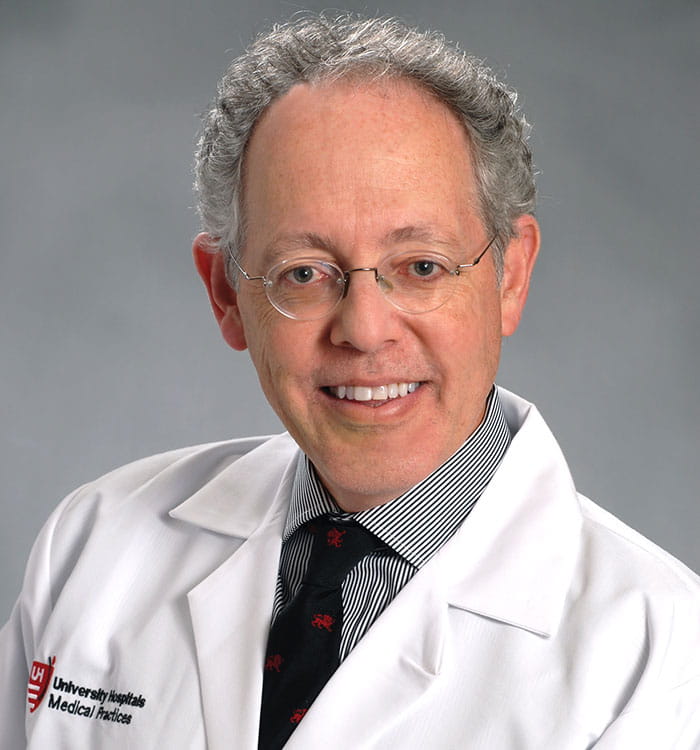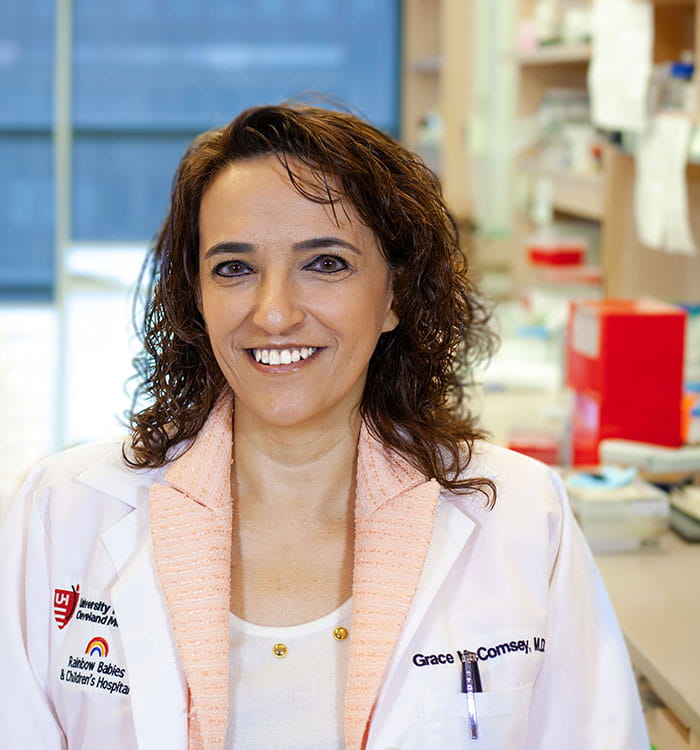COVID Recovery Clinic Provides Much Needed Care for Patients
November 09, 2021
Innovations in Pulmonology & Sleep Medicine | Fall 2021
With an estimated one of three patients experiencing mild to severe long-term symptoms following a COVID-19 diagnosis, it’s become critically important to identify and treat them, says David M. Rosenberg, MD, MPH, a physician in the Division of Pulmonary, Critical Care and Sleep Medicine at University Hospitals Cleveland Medical Center. To that end, a dedicated COVID Recovery Clinic has been established at University Hospitals Ahuja Medical Center in Beachwood, Ohio.
 David M. Rosenberg, MD, MPH
David M. Rosenberg, MD, MPH Grace McComsey, MD, FIDSA
Grace McComsey, MD, FIDSASymptoms of COVID-19 Long-Haul Syndrome Are Diverse
Post-Acute Sequelae of SARS-CoV-2 Infection (PASC), the medical term for what is commonly referred to as COVID-19 Long Haul Syndrome, is present for four or more weeks after the acute phase of the disease. The U.S. Centers for Disease Control (CDC) describes it as a patient’s lack of return to their usual state of health following acute COVID-19.
Although the most common symptoms of PASC include breathlessness and fatigue, the range of symptoms is diverse and may include pain, cardiac and pulmonary conditions, cognitive dysfunction, and loss of smell and taste. The symptoms overlap with those of other, non-related conditions and may vary widely among patients.
PASC appears to be unrelated to the severity of the initial illness, so even individuals with mild or undiagnosed COVID-19 can experience persistent symptoms. In fact, according to the CDC, among non-hospitalized adults with COVID-19, two-thirds had at least one visit to a physician within six months after their diagnosis. Because we’re still learning about this disease, physicians may not always recognize that their patients’ symptoms are COVID related.
“PASC can affect nearly every organ system in the body,” Dr. Rosenberg says. “For this reason, it’s important that patients receive multidisciplinary care. The University Hospitals COVID Recovery Clinic includes medical specialists from a wide range of disciplines including, but not limited to, cardiology, pulmonology, infectious disease, immunology and occupational and mental health. Furthermore, many patients who had COVID-19 have ongoing sleep disturbances, which can lead to or exacerbate other symptoms. Our sleep medicine experts will also evaluate and treat these patients for sleep-related health issues.”
The University Hospitals COVID recovery team meets regularly to discuss cases and to ensure every patient receives the best evaluation, treatment and supportive care for their unique symptoms and needs. This includes traditional medical care, integrative health interventions — such as stress management through the University Hospitals Connor Integrative Health Network — and mental health treatment services. Many patients with prolonged COVID symptoms experience stress, anxiety and depression, and early mental health treatment can help alleviate this distress.
“PASC is more common in adults over 50, women, non-Hispanic blacks and those who have other health conditions,” Dr. Rosenberg says. “It’s important to remember that children can also suffer long-term post-COVID symptoms, such as fatigue, gastrointestinal distress, fever and new-onset headaches, so University Hospitals Rainbow Babies & Children’s has a team of pediatric specialists to treat our youngest COVID patients. Physicians should be alert for post-COVID-19 symptoms and refer patients for additional care when appropriate.”
Common PASC Symptoms
- Shortness of breath, coughing and fever
- Fatigue and exhaustion
- Brain fog
- Atypical chest pain and palpitations
- Behavioral health issues like depression and anxiety
- Difficulties with cognition and memory
- Insomnia and other sleep problems
- Generalized pain and muscle aches
- Joint pain and impaired mobility
- Persistent loss of smell and taste
- Headache
- Diarrhea
- Skin rashes
National PASC Study
The National Institutes of Health (NIH) has selected University Hospitals as an official part of a national PASC consortium called RECOVERY. It is one of only 15 sites nationwide — and the only one in Ohio — to participate in a $1.2 billion grant to study PASC.
RECOVERY will enroll 20,000 adults with either acute COVID or PASC. The first phase is to conduct phenotyping to try to understand why some patients recover from COVID-19 right away and others suffer from PASC, says Grace McComsey, MD, FIDSA, Vice President of Research and Principal Investigator at University Hospitals Cleveland Medical Center and a member of the NIH steering committee on PASC.
“We will do a lot of interesting testing as part of this study,” Dr. McComsey says. “Patients with COVID-19 who continue to have any symptoms are welcome to contact me directly [216-844-5936] about enrolling in the study, even if they aren’t a University Hospitals patient. The testing can help them as patients, especially if they have high insurance copays or no insurance. Since the testing will not be done as part of clinical practice, we’re able to help them get it done within the research and NIH will pay for it.”
The cohort will also be extremely diverse, Dr. McComsey says, so patients in all demographics, across race, ethnicity, age, gender and geography will be represented in this national study.
Identifying and Referring Patients
University Hospitals is making it easy for patients to get the care they need. The COVID Recovery Clinic, under the direction of Dr. Rosenberg, is located at University Hospitals Ahuja Medical Center in Beachwood, Ohio. It offers both in-person and virtual care, and patients can schedule an appointment directly with the clinic.
“It’s important for primary care and specialists alike to realize that patients with PASC can have a wide range of long-term effects,” Dr. Rosenberg says. “Therefore, there is no one-size-fits-all solution. Each patient will receive a thorough assessment and personalized care, specially tailored to their unique situation, from a team of specialists with expertise in COVID-19. Know that we are here to help you provide the best possible care for your patients.”
To refer adults or children to the University Hospitals COVID Recovery Clinic, call 216-508-8656 to schedule an evaluation. Amy Edwards, MD, a pediatric infectious disease specialist at University Hospitals Rainbow Babies & Children’s Hospital, will assess pediatric patients and treat them accordingly.
“Our goal is to optimally manage patients’ symptoms through a coordinated, multidisciplinary approach so each patient can improve their quality of life and return to their pre-COVID health and activities,” Dr. Rosenberg says.
For more information about PASC or the University Hospitals COVID Recovery Clinic, call Dr. Rosenberg at 216-593-5684.
Contributing Experts:
David M. Rosenberg, MD, MPH
Division of Pulmonary, Critical Care and Sleep Medicine
University Hospitals Cleveland Medical Center and Director,
Lung Center, University Hospitals Ahuja Medical Center
Assistant Clinical Professor
Case Western Reserve University School of Medicine
Grace McComsey, MD, FIDSA
Vice President of Research and Associate Chief Scientific Officer
University Hospitals
Professor of Pediatrics and Medicine
Case Western Reserve University School of Medicine


